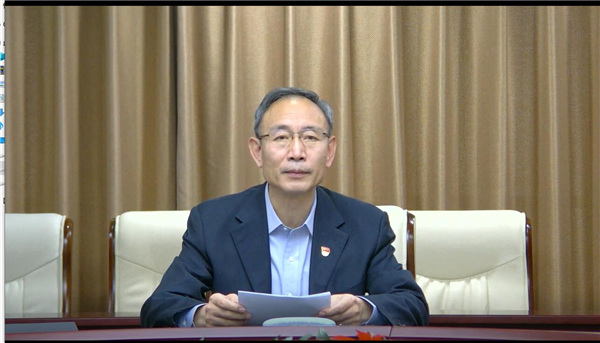The Open University of China (OUC) held a teaching and scientific research conference, the third of its kind, from 23-24 November 2021. The conference, which aimed to thoroughly study and implement the spirit of General Xi Jinping’s important speech on July 1, carry out the requirements of documents including the OUC Comprehensive Reform Plan e and the OUC 14th Five-year Plan Development Plan, promote the implementation of an innovation-driven development strategy, build a scientific research innovation system, and enhance the ability of scientific research innovation, was conducted via on-site meeting and online live broadcast.
Ju Chuanjin, researcher and vice president of the OUC, Professor Li Song, vice president and director of the OUC academic committee, and major leaders of the teaching and research departments of the OUC headquarters attended the conference on site. Leaders in charge of scientific research, staff from scientific research management departments, teachers and faculty engaged in scientific research from various units of the OUC system, and leaders in charge of scientific research and related staff from industry and corporate colleges attended the meeting online. The meeting was chaired by Chen Shougang, director of the OUC Scientific Research Management Office.

Ju Chuanjin announced his work deployment in a speech entitled “The high-quality development of open universities driven by scientific research innovations.” He pointed out that since the first teaching and scientific research conference was held in 2019, the concept of revitalising the university through scientific research has been gradually established and incorporated into the mindset of members of the OUC. Academic exchange activities have become increasingly dynamic, breakthroughs having been made in high-level scientific research projects, and the scientific research system has been improved. However, despite the above achievements, the OUC also faces challenges such as the need for breakthroughs in the functions of scientific research in serving teaching and decision-making, and furthering scientific research reform in terms of “delegating powers, enhancing regulations and strengthening services.” Ju Chuanjin reviewed the scientific research work of the OUC system since 2021 on the basis of scientific research and development data (including theses, projects, awards, etc.) selected from the OUC system. At the same time, based on the results of a “scientific research and development survey” of new young doctors over the past five years, he described the current situation and development demands for the training and professional development of young teachers. In light of the above situation and problems, he noted that, in the university’s scientific research work, we should use innovation as a breakthrough point and treat it as the core of the system. Innovation abilities must be the key elements for improving education quality and attention must be paid to the construction of an innovation system and the improvement of innovation abilities. Work must be concentrated in five areas: reforming the mechanism, optimising the platform, constructing a team for scientific research innovation, improving the system for learning achievement transformation, and promoting academic exchanges and cooperation.
During the conference, Professor Chu Hongqi, a national school inspector, president of Beijing Open University, and second prize winner at the Sixth National Outstanding Achievements in Educational Scientific Research awards, was invited to give a special report entitled “The nature and research of educational modernisation.” According to Chu Hongqi, educational modernisation refers to the process of the continuous growth and realisation of educational modernity accompanied by the change of educational modalities. Behind the modernity of education lies the pursuit of “a better life” and “a better society.” The value and significance of educational modernity or modern education is to serve freedom and liberation, as well as the construction of a modern society or a modern country. Educational modernity is characterised by humanity, productivity, democracy, rationality, professionalism, informatisation, internationalisation, and rule by law, all of which reflect the integration of value rationality and instrumental rationality. The key to the educational process lies in teachers being modern people with a modern spirit. Chu Hongqi’s lecture discussed the essence of educational modernisation, the transformation of educational modality modernisation, and the modernisation of educational modernisation research. The lecture, filled with wisdom and philosophical thinking, brought new enlightenment to and was highly praised by both the online and offline audiences.
In a branch venue set up at Zhejiang Open University, Zhang Jixian, researcher and vice president of Zhejiang Open University, shared his viewpoints from three aspects: the current situation and characteristics of scientific research in the OUC system, measures to promote the innovative development of scientific research, and efforts to build a research base for lifelong education in a speech entitled “Further developing a scientific research innovation mechanism and promoting research for lifelong education.”
The participants all said that although an on-site meeting could not be held due to the impact of Covid-19, the lectures given by the leaders and experts during the online meeting were thought-provoking and inspiring. They hope that the OUC headquarters and the branches will engage in more exchange and cooperation activities and make continuous efforts to improve the quality of scientific research.
Written by Chen Min; photos by Zhuge Huanyu,OUC